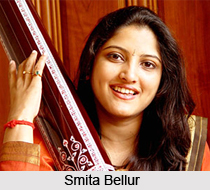 Smita Bellur was born to the family of Shri K. L Subba Rao and Smt. Susheela Rao as the third child. At the tender age 4 years, she started reflecting her talent. At the age of 7 years, she executed for the first time on stage. It was an inter-school competition in solo vocal singing. She started receiving Carnatic Music training when she was in the 4th standard. But the period was very short; it lasted for only six months. The reason behind this was their relocation to Bengaluru.
Smita Bellur was born to the family of Shri K. L Subba Rao and Smt. Susheela Rao as the third child. At the tender age 4 years, she started reflecting her talent. At the age of 7 years, she executed for the first time on stage. It was an inter-school competition in solo vocal singing. She started receiving Carnatic Music training when she was in the 4th standard. But the period was very short; it lasted for only six months. The reason behind this was their relocation to Bengaluru.
Early Life of Smita Bellur
At Bangalore Smita Bellur underwent training under the expert tutelage of teacher and Sangeet Natak Academy awardees - Shri P. R. Bhagwat. He started teaching her the Bhavgeet alongside `sa-re-ga-ma` alankars. When she was 12 years, she was inducted to one of the true forms of Hindustani classical music, Khayal. She underwent training for near about six years under Shri P. R. Bhagwat. He has sharpened the skills of Smita Bellur and taught her the intricacies of the Kirana Gharana of singing. According to her she received, `a strong foundation of raaga, taal and the basic elements of alaap and taankaari`.
Academic Life of Smita Bellur
After schooling and pre-university college, Smita Bellur went on to study engineering. In that juncture, her guru moved to Dharwad from Bangalore. At that time she also got the opportunity to record for a TV programme, namely `Aralu Mallige`. This programme was meant for the aspiring artists. Through this programme she came to touch with the famous Nakod family and she bagged the honour of being trained under the celebrated Sangeet Ratna`, late Pt. Arjunsa Nakod. Late Pt. Arjunsa Nakod has been considered as `the doyen of Gwalior - Kirana Gharana`. He was the disciple of the legendary Ganayogi Pt. Panchakshari Gawai - the blind saint-musician from Gadag. Late Pt. Arjunsa Nakod has taught her the ragas like Rageshri, Bhoop, Chandrakauns, Gorakh Kalyan, and Bihag. After completing her engineering, she went on to obtain a certificate from the QAI USA. Later on she went to work for a software company.
Life in Music for Smita Bellur
After the demise of Pt. Arjunsa Nakod, Smita Bellur went on her training under the illustrious son of Pt. Arjunsa Nakod, Pt. Bhalachandra Nakod at Hubli. She has also learnt the nuances of light music under Shri. Vishwanath Nakod. Pt. Bhalachandra Nakod has played a significant role in shaping the Gayaki style of Smita Bellur. Pt. Rajabhau Sontakke has also contributed a little in the style of Smita during her `Senior Diploma` course from Prayag Sangeet Samiti - Allahabad. It became dream comes true for her when she was selected as a graded artiste of All India Radio Dharwad.
Popular Shows by Smita Bellur
Being the regular and graded artist of all India Radio, Dharwad, Smita Bellur at the age of fourteen gave her first performance on Indian classical music at Rastrothana Parishat. Since then she has never looked back. Through out her professional career she has executed at various highly esteemed occasions like Swar Sadhana Samiti at Mumbai; Navraspur Utsav in the year 2005, Bijapur; Pt. Manmohan memorial festival in Jaipur; Bangalore Habba in the year 2006; Nizar Kala Sansthan in Nagpur; `Yuva Vandana`, Sree Satya Sai Baba Ashram, Whitefield Bengaluru; Sursagar in Bengaluru; Pt. Sawai Gandharv Punyatithi at Kundgol; Asthavinayak Pratishtaan, Lathur, Maharastra; Pt. Omkarnath Thakur Smriti; Ustad Imammuddin Dagar Music festival held at Jaipur; Sree Rama Seva Mandali - Fort High School, Bengaluru; Avani Rasika Ranga, Dharwad; Indian Institute of World Culture, Bengaluru; Shree Gururaghavendra Temple at Mantralayam, Andhra Pradesh; Dutta Gaana Sabha - Barshi Maharastra; `Samskrutika Sourabha` at Ananya, Bengaluru; Nadashri Sangeet Sabha, Hubli; Sangeet Pratishtana, Belgaum; Bharatiya Vidya Bhavan; `Yuva Gana Mela`, Karnataka Ganakala Parishat, Mysore; Pt. Panchakshari Gawai Punyatithi at Shree Veereshwar Punyashram- Gadag; Rudrapatna Music festival - Hassan; Govt. of Karnataka, Department of Culture and Kannada music festivals: `Chalukyotsav 2006` - Aihole- Badami- Pattadkal` `Karavalli Utsav`, 2003 - Karwar, 2006 Mangalore, `Lakkundi Utsav` 2006, Gadag` `Thingala Sobagu`, `Samskrutika Saurabha` and `Yuva Saurabha` at Gadag, Haveri, Bellary, Bidar and Raichur; Various mutts such as Hukkeri mutt, Sindhagi mutt, Irkal Mahantesh Mutt etc; Gokhale Institute of Public affairs.
Smita Bellur has recorded for All India Radio, Dharwad; As news items: Etv, TV 9; Interview on Zee TV Kannada; Udaya TV `Naada` (Sun TV Network); For a French Documentary by the French organization Kalavistar. Her skills includes Hindustani Classical: Khayal gayaki; Semi classical varieties such as thumri, dadra, kajri, chaiti and jhoola; Bhaktigeet: Bhajan (Hindi), Abhang (Marathi), Vachana (Kannada) and Daasarapada (Kannada); Bhaavgeet (Kannada); Jugalbandhi with Carnatik music (have performed at various Utsavs like Rama Seva Mandali, Rudrapatna Sangeetotsav, Vadirajara aradhane etc). She has also conducted many lecture demonstration to her credit.
Accolades Received By Smita Bellur
Acknowledging her talent Smita Bellur has been conferred the "Sangeeta Shri 2007" award by Shraddha Sangeeta Kala Samiti, Bengaluru and the "Dr. Pt. Puttaraj Gawai Kripa Bhushana Prashasti 2007" - Gadag. Today Smita Bellur as one of the founder members of the Bangalore chapter is attached with the co-operative of performing artistes, `Sangeet Sankalp`. Sangeet Sankalp is the famous nation wide. Sangeet Sankalp is a `non-profit co-operative society of artistes, by artistes, for the promotion of talented upcoming professional artistes and amateurs, across the country`. She also serves as the secretary of Nadashri Sangeet Sabha - an organization that promotes Indian Classical music.




















